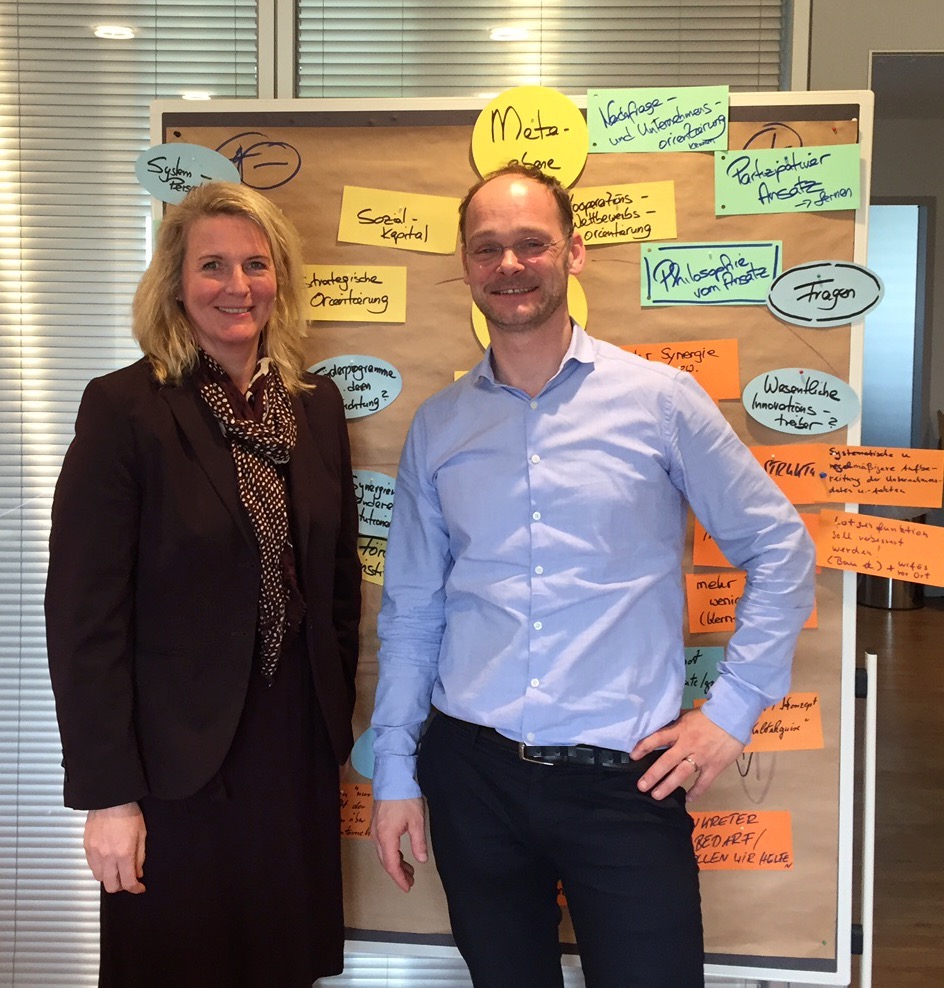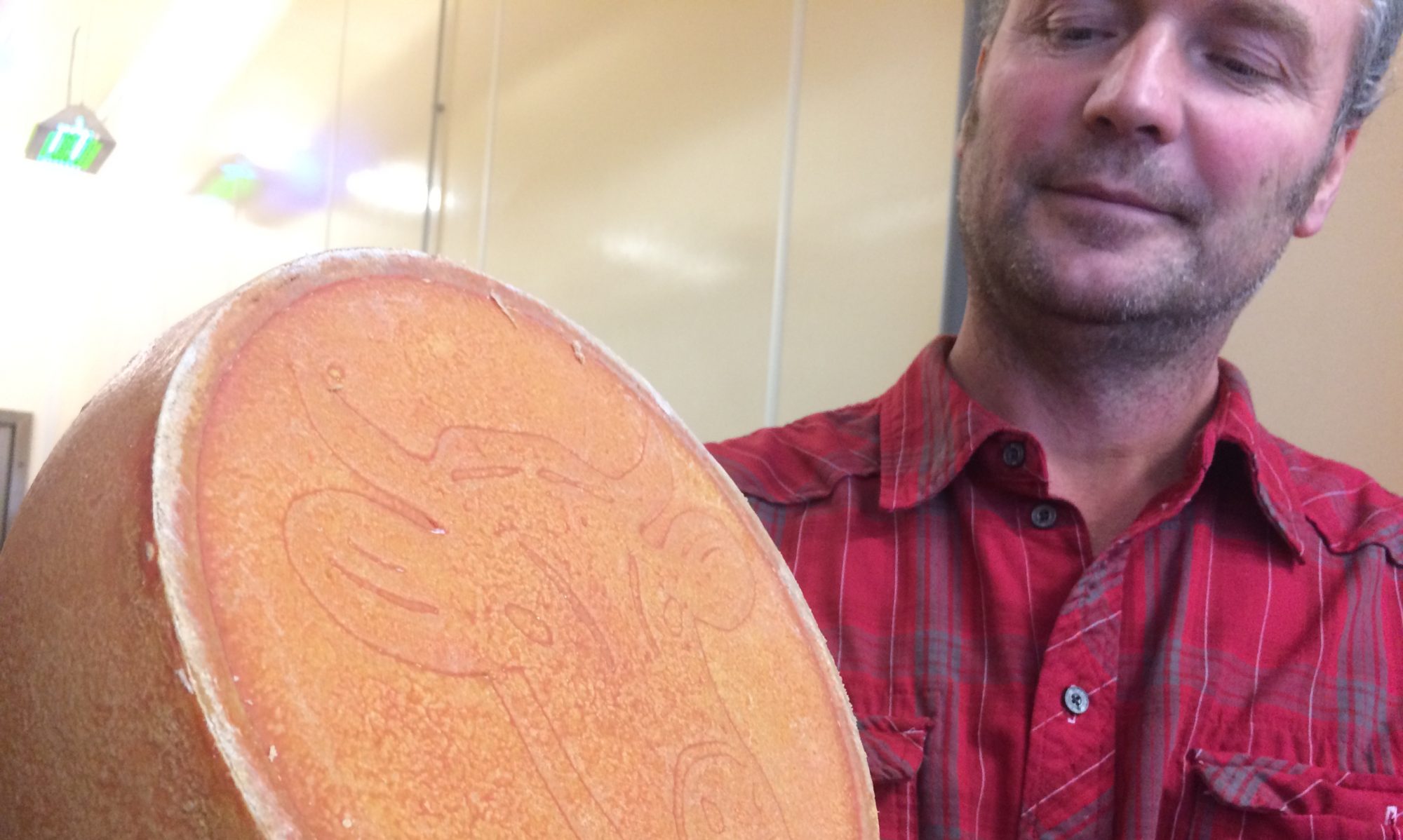Discussion between Birgit Neyer and Frank Wältring on the future of local economic development
Available also as German Videocast and Podcast
„How do we initiate a sustainable transformation process in rural areas and also rethink economic development at the local level to promote this way of development?“ is the crucial topic of the discussion between Birgit Neyer and Frank Wältring. Birgit Neyer is Managing Director of WESt mbH, the economic development agency of the district of Steinfurt, a region in Germany. Frank Wältring is business partner of the consulting firm Mesopartner and was born in the district of Steinfurt. He works internationally in the field of local and regional economic and innovation promotion. Both believe that the topic of sustainable transformation needs to be more firmly anchored in rural areas and in economic development promotion activities.
Frank Wältring (FW): We know that change starts in the cities and villages. How can we manage to integrate the topic of „sustainable innovation promotion within cities and regions“ into traditional methods of economic development promotion?
Birgit Neyer (BN): Things are already happening in this area, and it is advantageous to transfer these good examples. A consultant recently summed it up by saying: „The topic of ecology is the new digitalization within economic development promotion.“ I see it in this way too. This is where the future potentials for our companies and huge markets with demand lie. If we approach the topic as an innovation project, we will also reach the entrepreneurs. There are many opportunities here that have not yet been exploited.
FW: Is the topic already perceived in this way within companies and in economic development institutions? Has the potential for innovation already been recognized and sought out here?
BN: My experience in my region in Germany is that small and medium-sized enterprises are particularly sensitive and open-minded. The managing directors have close ties with their employees and often live in the places where their businesses are located. They sense the change in values among their own staff and among young employees. Younger people in particular now not only work to earn money, they also want to do something meaningful. If companies succeed in conveying this sense of purpose, they have a much better chance of attracting young people to their team. What is often needed here is not cost-intensive or large steps in companies, but the communication and implementation of one’s own sustainable goals and aspirations.
FW: When advising business development organizations, we usually try to broaden their perspective. That means looking not only through economic lenses, but also through social and ecological lenses when searching for innovative solutions. Merging these three lenses opens up the discovery of new local innovation opportunities. Many economic development agencies still tend to look primarily for local and internationally oriented entrepreneurs, zoom in on clusters, scan start-ups, and strengthen mainly economic innovation opportunities. What is often missing is looking to the left and right and discovering and promoting the potential that is right under one’s nose, for example, production approaches in the circular economy, sustainable business models, and promotion of innovative citizens‘ initiatives in villages, promotion of social entrepreneurship, and promotion of local common good initiatives such as repair cafes, village shops, etc. Citizens’ enterprises and other forms of enterprises such as cooperatives should also be considered. In Germany we are experiencing a boom in these forms of organization. Innovation mostly lies in the processes of social change. What we need is to broaden our perspective and the search process to find innovative sources for promotion.
BN: I also see it in this way. We are currently looking for new ways ourselves. In the Steinfurt district, we want to develop a concept to promote social entrepreneurship, i.e. one which will promote social enterprises that are not primarily profit-oriented, but will offer innovative social innovations and services. We will develop social enterprise ideas with pupils and thus sensitize them for self-employment. People are satisfied when they are self-determined. Our ulterior motive is to strengthen the start-up culture in the district of Steinfurt, to get people into action early and to discover new opportunities.

FW: In my home, a small village, I have always wanted the municipal economic development agency to help citizens think about their future, to develop ideas, to moderate village conferences with entrepreneurs and citizens, to support innovative ideas emerging from creative businesses and volunteer professionals. For me, awakening and bundling these forces is a clear task of local economic development.
BN: That is also my view of the matter. We have to learn to make something unique out of the resources that we have: we have to combine local forces, experiment with new connections, try out different things, and involve our existing networks and people. If we succeed in accomplishing this, something very surprising and creative will come out of it. The process of experimenting and connecting different people is ultimately what makes it alive and special. In the past, many business promoters pushed „the fun in the process“ into the „soft emotional corner“ and interpreted it negatively or skeptically. I believe it is the basic prerequisite for our innovation promotion work which will allow creative networks to develop. It is precisely this climate that we need and must foster in our municipalities and districts.
FW: This requires a willingness to experiment, less security thinking, the desire to get to know very different people, citizens and also lateral thinkers, and to involve and co-create with them ideas and local implementation initiatives.
BN: I think a lot has already been done here. In particular, the cooperation with start-ups has awakened new communication styles and a desire for discovery in many younger economic developers. We must continue to „rethink“ here and continue to try out new things – there are many entrepreneurs in the Steinfurt district as well, who are open to trying out new transformative approaches with creative formats.
FW: Sharing these inspirational examples is important. Do you have any examples from the district that are also setting new standards?
BN: Example 1: We are currently working with a company that wants to locate in the small city of Saerbeck which manufactures electrolyzers for hydrogen production. The company started their business in Saerbeck – they had 120 other locations to choose from. Saerbeck is a small city with around 7 000 inhabitants. It is one of the few German cities that has been honored as a “climate-sensitive municipality” due to its sustainable development efforts over the last 20 years. This has also created a competitive advantage by attracting environmentally sensitive companies. As the business investor also stated, “It is apparent here that the town set out on its own early on.“ With this entrepreneur, we developed the idea of an accelerator for sustainable business ideas which we are now realizing in Saerbeck.
Example 2 is a farmer, also from Saerbeck. He is not actually a farmer, but an entrepreneur running a system house with more than 50 employees. He transformed the former pig fattening farm into a highly efficient, digitalized organic vegetable farm which serves as a model for other organic farms. I am very much in favour of growing such sustainable and innovative examples.
FW: We refer to the district of Steinfurt as an economic centipede, i.e. many small and medium-sized enterprises with very different sectoral focuses. When you think of the reality of this district, what has to happen for it to become a model for future development?
BN: I would like to take the district forward to become a real laboratory for transformative development, where we promote future innovations in a variety of ways. It would give us the chance to network with actors from the district and beyond, and also to learn together with other future-oriented laboratories and similar projects, and to bring new discoveries to the fore. But it also means that we have to overcome sensitivities and narrow responsibilities. All too often, everyone is still intent on bearing activities on their own shoulders to justify their existence. We have to overcome departmental thinking and put networking at the forefront as a criterion for the success of our work.
FW: One final question: Is there any question that I should have asked that I didn’t ask, which is essential to the topic?
BN: Ultimately change always depends on people taking many small steps. I still ask myself how we can make people want to take the transformation forward. How do we make it fun? How do we get young and old, entrepreneurs, citizens and local experts involved in local development? These are questions I ask myself. We should experiment with this when we realize the transformation laboratory in my work and your home district.
FW: I am keen to support you in this agenda. Thank you very much for your honest reflection.
Further Blog posts and Videocasts from us around the topic of „Transformation in Cities“
